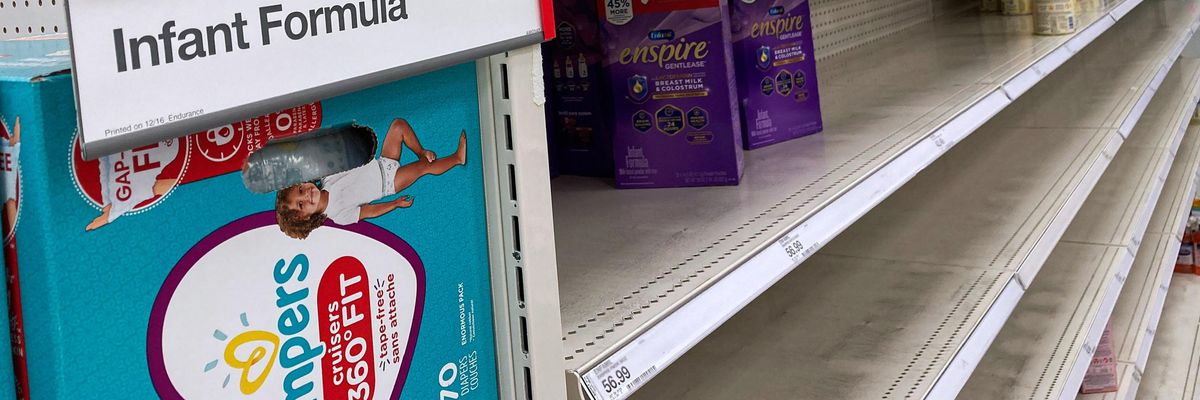Last October, a whistleblower sent the FDA a report detailing safety and sanitation violations at the Abbott Nutrition factory in Sturgis, Michigan, the largest baby formula manufacturing plant in the nation. It would be months before the FDA took action. Abbott fired the whistleblower. Four babies who had consumed formula from the plant suffered bacterial infections; two of them died. The FDA could not conclusively link the illnesses or deaths to the plant. In February, Abbott shut down the plant and announced a voluntary recall of its Sturgis-manufactured baby formula. The FDA followed with a product warning. The life-threatening formula shortage was not due to a natural disaster or circumstances beyond Abbott's control. Rather, it is a predictable outcome of corporate greed, a coverup, and a captured regulatory agency.
In many cases, infant formula is a vital necessity, providing life-saving nutrition for thousands of babies in the U.S. for whom breastfeeding is not possible due to allergies, immune conditions, or other situations.
Four corporations control 90% of the baby formula market in the United States. Abbott Laboratories, which produces Similac, leads with 40%, followed by Rickett, which makes Enfamil (and Lysol) at 30% of the market. The Biden administration is facing mounting criticism for its delay in addressing the Sturgis plant's health and safety concerns and for failing to anticipate the formula shortages caused by the plant's closure. In many cases, infant formula is a vital necessity, providing life-saving nutrition for thousands of babies in the U.S. for whom breastfeeding is not possible due to allergies, immune conditions, or other situations. Parents of color are more likely to use formula in the first three months of an infant's life than white parents.
President Biden met virtually Wednesday with executives from five baby formula manufacturers: Bubs Australia, ByHeart, Perrigo Company, Reckitt and Gerber, owned by Nestle. Abbott was absent, reportedly not invited by the White House. The President has launched "Operation Fly Formula," easing import restrictions to allow emergency shipments of formula from the UK and Australia, and has invoked the Defense Production Act to accelerate domestic production. Abbott has been importing formula from its FDA-registered facility in Ireland.
The whistleblower report was received by the FDA in October, but the whistleblower was not interviewed until December. The whistleblower's report was released publicly last month in a House Appropriations Committee hearing chaired by Democratic Congressmember Rosa DeLauro. The report stated, "lax practices, including regulatory violations, were consistently overlooked," and described a pervasive "fear of retaliation" for those who dared to "rock the boat." Following the hearing, DeLauro said in a statement, "The FDA is a regulatory agency - period. It is about time they acted like one."
David Dayen, executive editor of The American Prospect, explained how these few large corporations obtained their power over the infant formula market with the help of an essential federal program, speaking on the Democracy Now! news hour:
"The reason is that we have a program called Women, Infants and Children, the WIC program, and about half of all formula passes through that program and goes to poor families. It's very well intentioned. The government gets very large discounts for purchasing formula and then getting it to poor families. But each state does a competitive bidding process with a formula company, and in exchange for those volume discounts, they get market exclusivity...So what you end up having is these little monopolies in all 50 states."
Formula is critical for the proper nutrition of many babies, but is generally considered less beneficial than breastfeeding. The Lancet medical journal issued a comprehensive series on the benefits of breastfeeding in 2016, finding that "the deaths of 823,000 children and 20,000 mothers each year could be averted through universal breastfeeding, along with economic savings of $300 billion. The series confirms the benefits of breastfeeding in fewer infections, increased intelligence, probable protection against overweight and diabetes, and cancer prevention for mothers." Breastmilk, the series concludes, "makes the world healthier, smarter, and more equal."
David Dayen, in his book, "Monopolized: Life in the Age of Corporate Power," describes how the U.S. government has bullied countries in the Global South that try to promote breastfeeding over formula. At a 2018 meeting of the UN-affiliated World Health Assembly, Ecuador's proposed resolution to "protect, promote and support" breastfeeding was gutted by the U.S. delegation, which threatened to withhold aid to any nation opposing the U.S. stance. The U.S. delegates, Dayen writes, "were operating on behalf of the $70 billion, deeply concentrated global baby formula industry."
After signing a long-delayed consent decree with the FDA, Abbott is expected to reopen its Sturgis plant as soon as this weekend, potentially alleviating the worst of this crisis by the end of July.
Meanwhile, this corporate formula cartel profiting off babies' bellies while feeding at the public trough must be reined in, constrained by effective regulation and empowered consumers.
